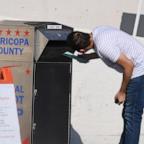13 Worst Cities for Spring Allergies
The Asthma and Allergy Foundation of America ranked the worst allergy cities.
April 8, 2011— -- "Today is going to be beautiful, now let's just chop off my nose and smooth my eyeballs with sandpaper," Patrick Kuc wrote on his Facebook wall Wednesday.
That's because Kuc lives in Louisville, Ky., a place known for its lovely springtime but is notorious for wreaking havoc on the lives of allergy sufferers.
Louisville is not the only locale that poses problems for the allergic. It turns out that in many cities, the welcoming of spring weather is overshadowed by runny noses, itchy eyes and antihistamine-induced sleeps.
For nine years, the Asthma and Allergy Foundation of America has released a list of the 100 worst cities for allergies in the United States. This year, Louisville ranked second on the list. Kuc has always suffered from seasonal allergies triggered by pollen and mold, but now on most mornings, he wakes up with red itchy eyes, a sore throat and runny nose before popping his daily antihistamine.
"This year is particularly horrible in Louisville," said 27-year-old Kuc. "I've had allergies in November. It's this Ohio Valley. The air sticks and pollen is just everywhere. The sidewalks become yellow from it."
Worst Cities for Allergies
"Allergic symptoms in the spring are caused by a significant increase in the tree and grass pollen," said Dr. Wesley Burks, professor and chief of pediatric allergy and immunology at Duke University Medical Center. "Other environmental conditions, such as pollution can then exacerbate the person's symptoms.
"The climate in these cities is good for a long and heavy pollen season."
Knoxville, Tenn., Louisville, Ky., and Charlotte, N.C. rounded out the top three worst cities for allergies in the United States.
"Some of these cities mentioned in the Southeast are known to have prolific amounts of seasonal tree, grass, weed, pollens and mold spores that can wreak havoc in those susceptible to seasonal allergies," said Dr. Clifford Bassett, medical director of the Allergy and Asthma Care of New York.




